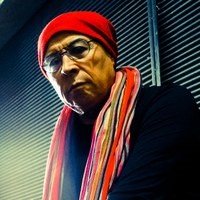Santiago (Chile), 1952 – 2015
By Fernanda Gdynia Morotti
Visual artist, writer, poet, and bold interpreter of his provocative verve, he challenged the prejudices of Chilean society by highlighting the marginal and inferiorized condition of homosexuals. Son of Pedro Mardones Paredes and Violeta Elena Lemebel, since childhood his feminine personality led him to a life trajectory incompatible with Catholic morality and the stigmatizing judgment of conservative Chilean society. Lemebel studied visual arts at the University of Chile, was an art teacher, and at the age of 26, won first place in the “Concurso de la Caja de Compensación Javier Carrera” with the short story Porque el tiempo está cerca.
A communist, he was discriminated against in party meetings for his feminine mannerisms and his homosexuality. In 1986, wearing high heels and makeup, he read the manifesto Hablo por mi Diferencia at a left-wing party meeting at the Mapocho train station in Santiago, to a bewildered audience. From then on, he clearly and unmistakably embraced his nature, wearing high heels and makeup in public. In 1987, he joined poet Francisco Casas to form the artistic duo Las Yeguas del Apocalipsis. The duo performed surprise, irreverent, performative acts at cultural events such as book launches and art exhibitions. The Chilean media often classified such appearances as “a phenomenon of counterculture.” Las Yeguas del Apocalipsis did about twenty performances, sometimes dressed as Frida Kahlo or Lady Godiva, other times with their bodies buried in lime, but always drawing attention to the defense of human rights, democracy, and the right of everyone to fully live their sexuality. The duo’s final performance took place at the VI Havana Biennial in Cuba in 1997. From then on, Lemebel dedicated himself to writing, especially chronicles for magazines and weeklies.
Tengo Miedo Torero (2001), Lemebel’s only novel, earned him international recognition, being translated into French, English, and Italian, and becoming the best-selling book in Chile that year. Between 1995 and 2013, he published eight books of chronicles, and some of his texts were adapted for the theater. In 2013, he performed a piece about the 40th anniversary of the Chilean military coup at the Buenos Aires International Literature Festival (Filba). He received the Anna Seghers Award in 2006, the José Donoso Award in 2013, and was nominated six times for the Chilean Altazor Award for National Arts. Diagnosed with laryngeal cancer in 2011, he passed away on January 23, 2015, as a result of the disease.



